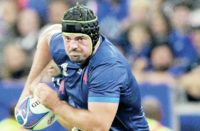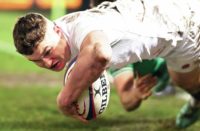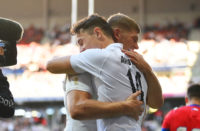 Alex Goode has shown that he can carve out time and space in the crash-bang mayhem of international rugby, and that priceless asset makes him a rarity among his Saracens and England team-mates.
Alex Goode has shown that he can carve out time and space in the crash-bang mayhem of international rugby, and that priceless asset makes him a rarity among his Saracens and England team-mates.
It is an ability that usually marks out a player in an elite team sport as exceptional, with one foot already in the world class camp. However, it is only consistent excellence that merits the title world class, and Goode would be the first to acknowledge that he is no more than an apprentice given that his exposure at international level is limited to starting at full-back in England's drawn third Test against South Africa in Port Elizabeth in June, plus a few minutes off the bench in winning his first cap in Jo'burg in the second Test.
The signs, though, could not be more promising for Goode. He and Mike Brown of Harlequins are the two front-runners for the full-back berth following the ankle injury to Ben Foden last weekend – ruling him out of the autumn internationals – although there is no question of it being by default, given that they had nudged the impressive Northampton strike runner onto the wing during the summer tour.
Goode, who is the incumbent England No.15, having worn the shirt with distinction at the Mandela Bay Stadium, and Brown,who was injured during the first Test against the Springboks in Durban, had staked their claim already. Which means that whatever the rights or wrongs of Foden being moved around the back three, the upside for England coach Stuart Lancaster is that Goode and Brown have been tearing up the turf in the new Premiership campaign in their bid to claim the full-back shirt – and, so far, there is little to chose between them.
Where Goode, 24, could have the edge over Brown is that his immaculate display against the Boks, showing outstanding poise, composure, positioning and kicking skills, also included a neat 10 minute cameo at fly-half in Port Elizabeth when Owen Farrell was blood-binned. Lancaster has also stated that he wants a second play-maker in his backline, and the unorthodox, ghosting Sarries full-back has the right credentials.
Goode says that his composure on his first international start was no mask. “I felt unbelievably calm and in my element. I suppose I felt I had earned it, and deserved to be there. I had bided my time, I was 24, and had played 100 games for Saracens over four years. My attitude was it's your one shot, so don't just dip your toe in.”
Even so, he does not consider himself to be in pole position. “It is very competitive with Mike Brown, and it brings out the best in both of us. It's great to know you can cope at the highest level, but I'm under no illusion that in the autumn it will be about form. It's about playing so well over the next six weeks that it's very tough for them to leave me out.”

Goode's versatility is explained by the fact that the Cambridge-born youngster played fly-half all his career until he was moved to full-back by Saracens three years ago, including playing No10 in the 2008 Grand Slam-winning England U20 team, who were also Junior World Championship finalists.
The dilemma Goode found himself in encapsulates the fractured positional paths that occur too frequently in English rugby, with club coaches seeing a player in one role, whereas national coaches see them in another, with not too much in the way of communication and joined-up thinking between the two set-ups. That is why I was dismayed when Saracens, under Brendan Venter, gave Goode only a brief run at fly-half before opting for the South African kicker Derrick Hougaard as their first choice, and pointing the youngster towards a future at full-back.
Fortunately, Goode's natural footballing ability is such that he has turned the transition into an unqualified success, but there is still a nagging sense that while England's cupboard is pretty bare at fly-half with the 2015 World Cup three years away, they are over-stocked at full-back with Goode, Foden, Brown, Nick Abendanon, and youngsters like Gloucester's Jonny May and Sale's Rob Miller also in the hunt.
Goode recalls: “Eddie Jones signed me for Saracens as a fly-half, and he pushed me harder than any coach, making me realise what pro rugby was about. Then, when Brendan came in, I had a season at No15 to help my development, and it ended with me playing there in a Premiership final. The following season I was told that the plan was for me and Derick Hougaard to play at No10, but soon afterwards I was told that although they thought I could be a very good fly-half, in terms of the club it worked best with me at full-back, where I would be first choice and lead our attack.”
Goode says that the Saracens coaches were true to their word, and that he has no complaints. However, he makes this admission: “I was a bit disgruntled at the time, but I got into the Saxons, and overall the season went well. Fly-half is a wonderful position, but it is not one that you can just wander into. You have to get into the rhythm by playing there regularly, because you control the whole team, and you live or die by it. Having gone through a tough period when I was playing one game at fly-half and the next at full-back, I realised it was best to concentrate on one of them.”
He adds, “I'm now in my fourth season at full-back, I've learned the trade, I've been capped there, and it's a position I enjoy. But if someone asked me to play No.10 again I would always give it my best shot.”
Ball-playing skill is in Goode's sporting genes. His aunt, Jo Goode, won a badminton bronze medal at the Sydney Olympics, while his parents were both talented rackets players, his father a top amateur badminton player and mother a Junior Wimbledon tennis graduate. His own sporting journey at school was remarkably diverse, including training at the Ipswich Town academy, competing in the National Schools Championships athletics in the hurdles and triple jump, and squeezing in some junior county tennis.
Something had to give, and Goode explains why he gave up football to continue with rugby at The Leys school and for his local club, Cambridge, in his mid-teens. “I was falling asleep on the way to and from Ipswich, and my mum, who is a schoolteacher, knew that it was starting to interfere with my schoolwork. I was also playing rugby with friends, but at the football whole families would come along to cheer on their potential money-maker, and there was the same pressure in tennis. I remember playing one kid in a tournament who had been home-schooled by his dad, and the bloke just stared me out the whole game while shouting ‘It's in' on his son's shots, and ‘That's out' on mine.”
Through his multi-sport grounding Goode has developed an outlook on pro rugby that is both phlegmatic and incisive, with his views on the modern full-back role reflecting a keen tactical insight.
“People tend to pigeon-hole you, but if I get picked again by England maybe I can bring the option of having two points of attack, from full-back as well as fly-half. Defences have become so good that if you take the fly-half out of the game, and he is the only tactical kicker, then you shut that team down. So, ideally, you need more than one option, a bit like the Aussies when they had Latham, Larkham and Giteau. With three kickers of that quality they were consistently able to change the point of attack and exploit space.”
Ask Goode about the shortcomings that both Saracens and England shared in attack last season – revisited in the damp squib showdown against Leicester at Wembley last weekend – and he argues that it is a question of familiarity. “Attack takes time together, understanding each other so that you recognise opportunities instantly, and perhaps we are not as good at that as others.”
That is why Goode's enthusiasm for Chris Ashton's arrival in the Saracens back three is transparent. “Chris is so infectious in attack the whole time. Now we are set to go from anywhere – his energy is brilliant, but he also works very hard and has made me realise a lot more about support lines.”
Goode notes that off the pitch support lines have become more blurred as players attract unwanted attention, but still manages a measured response to the England wing being glassed by an assailant in a restaurant last weekend.
“I wasn't there, but it's becoming tougher for players in public, and Chris was blindsided, which is so unlucky. However, if we want more endorsements and sponsorships then being in public is a part of it, and, if we seek the limelight and become more high profile, then we also have to be more careful and vigilant. It's not that we should be monks, but you just need to be aware and have the right people around you.”
The Saracens full-back expects a full-blown assault as Exeter go after their second home win of the season today, following last week's shock defeat at London Welsh, but says he hopes for the all-court game to rise to the challenge, whatever form it takes.
“Sandy Park is not an easy place, especially after a loss….the way the game has gone the full-back is no longer a classic runner like Serge Blanco or Christian Cullen hitting the line, and now you need a 15 who can take responsibility off the 10 and keep the defence guessing.”
Goode believes if he can do that regularly this season, then anything is possible.
“To be an outside bet of making the Lions would be fantastic because it is every player's dream, the pinnacle. Some people might say that's ridiculous coming from a novice with one Test start, but you have a chance.”
And the evidence is already out there in multiples that if you give Alex Goode an opening he tends to make the most of it.

























